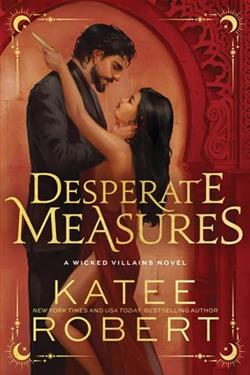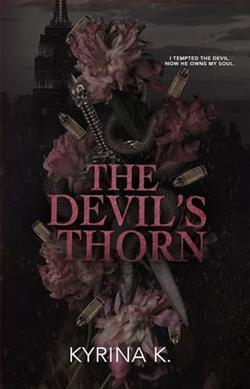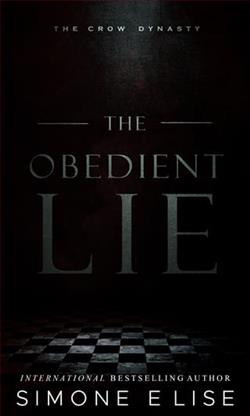Page 46 of Last Resort
“No. I couldn’t come out and say that in the book—my publishers were afraid of lawsuits or maybe of finding a horse’s head in their beds,” the author replied. “But I don’t think anyone at that time thought it was really an accident, and that includes the cops. They just couldn’t prove anything.”
“Do you think anyone has found Edwin’s loot?”
Castellammare took longer to answer. “Are you a treasure hunter?”
“No. But I think someone killed Tom Raines because they thought he found a clue to his grandfather’s stash, and I’m trying to keep other people from getting hurt,” Ben replied.
“I don’t know where it is, and I wouldn’t tell you if I suspected anything,” the writer said. “Just to get that out of the way. But I don’t have any reason to think the money’s been found. If a civilian stumbled upon its hiding place, there’d be news coverage. If the Mob recovered it, there would be ripples. I still hear things, on occasion, through my sources.”
“The heist was over a hundred years ago. Everyone involved is long dead,” Ben pointed out.
“The Mob has a very long memory, Mr. Nolan. If you’ve done any research, you should know that.”
Oh, believe me, I know first-hand.Ben’s hand rose to rub the old scars from the bullet wounds that ended his career as a cop and nearly killed him.
“What form was the money in when Edwin took it? Gold? Paper bills? Bearer bonds?” Surely Edwin would be smart enough to steal real money and not house chips that would be completely worthless.
“The fire that night—arson, clearly—caused a lot of chaos, which helped Edwin get away with what he did,” Castellammare said. “One of the cashiers at the Fun Factory said that Edwin held up the casino’s cage in the midst of the evacuation, shot the guards, and demanded all the ‘assets.’
“I think he picked that night for the heist because there were some Great Gatsby-type high rollers in from New York who were paying in gold and silver,” the author confided. “Either he knew what to expect from them, or he’d been waiting for the right time and seized the moment.”
“If that’s the haul he got, it could still be valuable after all these years,” Ben replied. Paper money would turn to sludge if not stored carefully, and stock certificates could become worthless over time. Silver and gold retained their value.
“Exactly. I wrote my theory that Edwin intended to skip the country, so he hid the treasure while he put together what he needed,” Castelammare said.
“He probably had a hiding place already picked out because he wouldn’t keep the goods on him. We don’t know what he did in the time between fleeing Cape May and being killed in the accident. It was only a few days, but he could have gotten a couple hundred miles away on a train and back. The treasure could be anywhere in that radius,” the author continued.
Not anywhere. He’d pick a remote location, one where no one was likely to see him hide the goods.Ben made a note to figure out the railroad lines at that time to see if any likely sites jumped out at him.
“Rumor has it that Edwin’s son, Galen, was killed not just because he was carrying on the family tradition of skimming money from his employer but because someone thought he might know where his dad buried the loot,” Ben suggested.
“If Galen knew, he would have taken the money and set himself up like a king in Mexico,” Castelammare said. “He wouldn’t have kept working as a low-level accountant. I can believe that Galen looked for the stash, and people watching him decided to take over the search, but I don’t think he found anything himself.”
Ben had to agree with that logic.
“Galen’s son Tom embezzled millions and then vanished for over two decades,” Ben said. “Until he turned up dead under an assumed name in a Cape May rental unit. Can you think of any reason Tom would have come out of hiding besides having a credible lead on Galen’s treasure?”
Castelammare didn’t answer immediately, and Ben thought he might skip the question. “I don’t know anything. Don’t drag me into this. I’ve managed not to get killed so far, and I’d like to keep it that way. But…I think your theory is likely. Not that Tom actually did know where to find the money, but he thought he did.”
“He probably thought everyone had forgotten about it,” Ben mused.
“Like I said—long memories,” the author cautioned.
“Just a few more questions.” Ben sensed he was running out of goodwill. “Your book had a fascinating chapter about mobster superstitions, supernatural secret societies, and witches. Do you believe in that sort of thing?”
“Cape May’s one of the most haunted places on the Jersey Shore,” Castelammare answered. “It’s got more ghosts per square foot than anywhere besides Salem and Charleston. Hard to spend time there and not at least wonder.”
“We had a case here where the ghost of a mobster’sstregacaused a lot of problems,” Ben said, and realized how unhinged that could sound. “Did Edwin cross someone’s witch? He worked for the owner of the Commodore Wilson Hotel, which everyone thinks is cursed.”
“Rumor has it that the owner of the Commodore Wilson at the time, a guy named Nathan Jepson, asked a big shot in the Atlantic City Mob for money to help him save his hotel and got turned down,” the author replied.
Ben thought about the old plate Erik had set aside and the images it had shown him.Did he see Jepson get turned down by the Mob, which was the nail in the coffin for Jepson’s ownership? Or was the actual incident more violent?
“Were the Bone Men involved?” Ben asked.
Ben had never seen the term “Bone Men” before Castelammare’s book, but he vowed to ask Teag and do some digging. It referenced a cabal of witches, sentient creatures like vampires and werewolves, and ghosts who made up an underground supernatural syndicate.
“If you know what’s good for you, leave that alone,” the author cautioned, and Ben picked up a note of fear in the man’s voice. “Some of them are immortal, or at least, unusually long-lived. They’re real, and you do not want to mess with them. You definitely don’t want them on your trail.”















